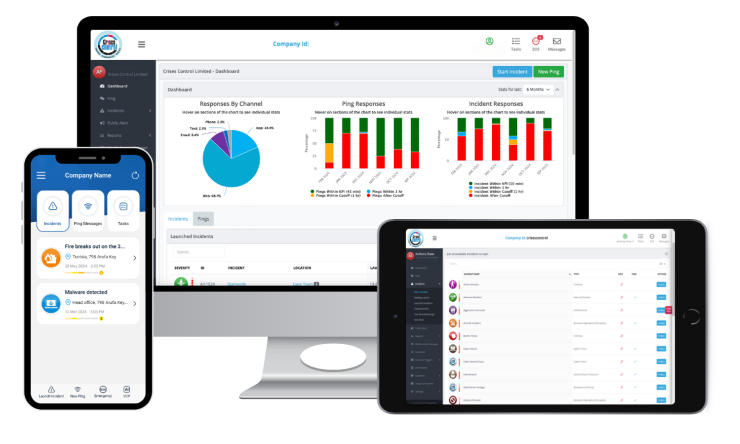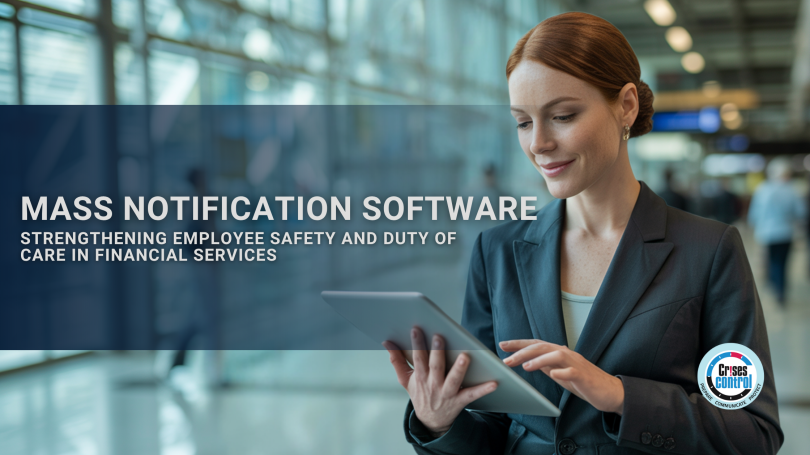Written by Anneri Fourie | Crises Control Executive
Why Mass Notification Software Matters in Financial Services
Picture this: a trading floor in London suddenly loses access to its core network, while compliance staff in Singapore are left in the dark. Within minutes, confusion spreads, customers start asking questions, and leadership struggles to get accurate updates. What turns a manageable disruption into a full-blown crisis is not always the incident itself, but the failure to communicate quickly and clearly.
Financial institutions manage risk for a living, but when it comes to crisis communication, many still rely on outdated tools like phone trees, long email chains, or static spreadsheets. In a world where teams are global and regulations are tightening, these old systems simply can’t keep up.
This is where mass notification software changes the game. By sending targeted alerts across multiple channels, it allows firms to reach employees, customers, and stakeholders instantly. For financial organisations, that means protecting people, maintaining business continuity, and proving operational resilience under pressure.
Crises Control, a leading crisis management and mass notification platform, helps firms do exactly that. It gives organisations the ability to communicate with precision, coordinate faster, and demonstrate full control during disruptive events.
How Mass Notification Software Enhances Operational Resilience
Regulators are making operational resilience a top priority. The Financial Conduct Authority (FCA) in the UK, the Digital Operational Resilience Act (DORA) in the EU, and the US SEC’s new incident disclosure rules all require firms to show they can respond quickly and effectively to operational disruptions.
When an outage, cyber incident, or security threat occurs, time and clarity are critical. Mass notification software supports resilience by sending immediate alerts through multiple channels; text, email, mobile app, Microsoft Teams and voice, so messages still reach people even if one system fails.
With a strong platform in place, financial firms can:
- Deliver accurate information to the right teams instantly
- Keep audit trails of all communication for compliance and reporting
- Enable decision-makers to coordinate across time zones and departments
Crises Control takes this further. Our platform combines alerting with automated workflows, allowing incidents to trigger specific response actions, such as escalation to crisis teams or activation of a business continuity plan. This means response teams spend less time chasing updates and more time solving the problem.
Duty of Care and Employee Safety in Financial Institutions
Financial institutions operate across borders and time zones, often under intense pressure. Their people work in trading hubs, corporate offices, and home environments. This brings flexibility, but it also creates new safety challenges. Firms have a duty of care to protect staff wherever they are and to demonstrate that protection to regulators and stakeholders.
Employee safety is not just about emergencies inside the office. It also includes travel risks, severe weather, civil unrest, and unexpected transport disruptions. During such events, leaders must be able to locate and contact employees quickly, confirm who is safe, and offer support to those in need. Manual processes simply can’t handle this level of complexity.
Mass notification systems give firms a structured, reliable way to manage staff safety during critical moments. Features such as:
- Location-based alerts that target messages only to those in affected regions
- Two-way messaging so employees can confirm they are safe or request assistance
- Real-time dashboards that show who has responded and who might still be at risk
Crises Control also includes an SOS and Panic Button feature. If an employee is in danger or needs immediate help, they can send an alert to their crisis management team, including their GPS location. For financial professionals travelling abroad or working remotely, this level of safety support can be life-saving.
How Mass Notification Systems Improve Duty of Care for Remote and Global Teams
Remote and hybrid work have transformed financial services. Traders, analysts, and operations staff often work from home or shared spaces across multiple regions. While this flexibility improves efficiency, it also creates uncertainty during an emergency. Who is available? Who is at risk? How quickly can everyone be reached?
Mass notification systems connect all staff through a unified communication platform, no matter where they are or what device they use. This ensures that every employee receives timely, accurate information and can respond quickly.
With Crises Control, financial institutions can:
- Send alerts instantly to mobile, email, or voice channels
- Confirm receipt and track acknowledgements in real time
- Enable two-way updates so managers can make informed decisions
- Schedule regular drills to test communication plans
Beyond emergencies, these systems help firms prepare and prove compliance. By scheduling routine tests, collecting response data, and documenting each drill, organisations can demonstrate to regulators that their communication framework is effective and continuously improved.
Real-World Use Cases in Financial Services
Many financial institutions have business continuity plans on paper, but few have tested how well their communication processes actually perform under pressure. These real-world examples (shared anonymously) show how automated alerting makes a measurable difference:
Global Investment Management Firm
A sudden power outage at a European data centre interrupted trading operations. Using Crises Control, the company sent instant notifications to its IT and operations teams, directing them to switch to backup protocols. Downtime was minimised, compliance reports were submitted on time, and clients experienced no disruption.
Regional Wealth Management Company
When severe weather hit Asia, the firm used Crises Control’s location-based alerts to advise employees to work remotely. Staff confirmed their safety through the mobile app, and managers used the system’s audit trail to verify compliance with internal health and safety requirements.
Middle Eastern Asset Manager
During a period of political unrest, several staff members activated the SOS feature from their mobile devices. The crisis management team used the live dashboard to locate them and arrange secure transport. Business continuity was maintained, and all staff returned safely.
These examples underline a simple truth: having clear communication systems in place before an incident determines how quickly a firm can recover from one.
The Regulatory and Reputational Imperative
Regulators now see communication as an essential part of resilience. Firms must not only recover from incidents but also prove they can communicate effectively throughout. Delayed or inconsistent communication can lead to penalties, reputational damage, or loss of customer confidence.
At the same time, investors and clients expect transparency. When disruption occurs, they want reassurance that the organisation is in control. A well-managed communication process protects not just operations, but trust.
By using Crises Control’s mass notification software, financial organisations can:
- Demonstrate compliance with FCA, DORA, and other global regulations
- Keep timestamped logs for audit and review
- Ensure consistent and factual information reaches employees and stakeholders
This combination of speed, accountability, and documentation helps firms meet both their legal obligations and their ethical duty to protect people.
Building a Culture of Preparedness
Technology is powerful, but people make it effective. Financial firms that perform best in crisis situations are those that build a culture of preparedness, where communication drills, scenario planning, and safety awareness are part of everyday operations.
Crises Control supports this approach through:
- Regular testing tools to simulate alerts and measure response times
- Analytics that highlight strengths and areas for improvement
- Custom templates for specific incident types, from cyber breaches to evacuations
When communication becomes second nature, response speed improves dramatically. Staff gain confidence, management gains oversight, and the organisation can prove to both regulators and clients that it is ready for any challenge.
Why Financial Firms Choose Crises Control
Financial services operate in a sector where a few minutes of uncertainty can lead to major losses or reputational risk. Crises Control was built to help firms avoid that outcome.
Key advantages include:
- Multi-channel delivery: Messages sent through SMS, push notifications, email, and voice to maximise reach
- Global reliability: A scalable infrastructure that meets data privacy and jurisdictional requirements
- Audit-ready reporting: Every alert and acknowledgement is recorded for transparency
- Integration with business continuity workflows: Alerts can automatically trigger escalation steps or next-stage responses
- Employee-focused tools: Features like the SOS button and location sharing ensure staff can call for help wherever they are
Crises Control gives financial institutions more than software. It provides a structured way to protect people, strengthen compliance, and maintain confidence through any disruption.
Preparing for the Future of Crisis Communication
The future of financial services will depend as much on resilience as on innovation. Firms that can communicate clearly during uncertainty will recover faster, retain clients, and meet the growing expectations of regulators and investors.
Mass notification software is no longer a back-office tool. It is a core component of operational strategy and a sign of leadership. It shows employees and customers alike that your organisation values safety, transparency, and reliability.
Contact Crises Control for a Free Demo
Protecting people protects performance. Financial institutions that invest in better communication today will be better prepared for tomorrow’s challenges.
Crises Control helps organisations build resilience with tools that enable rapid alerts, two-way communication, and complete accountability.
Contact us today for a free demo to see how our mass notification software can help your firm communicate faster, protect employees, and meet duty of care obligations with confidence.
Request a FREE Demo

